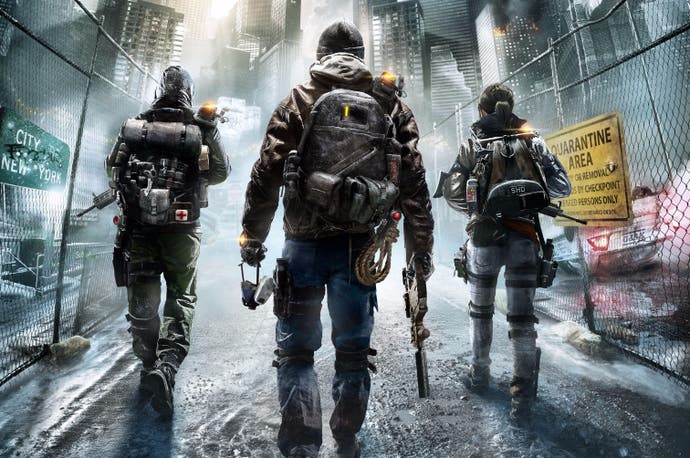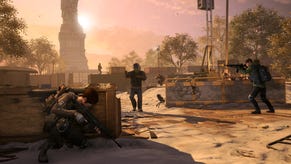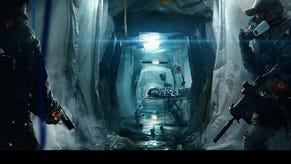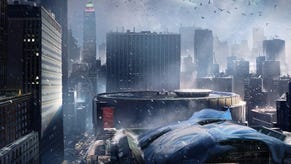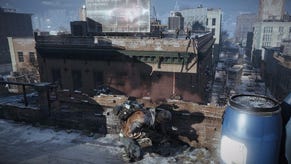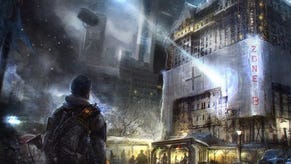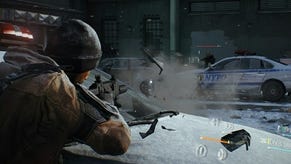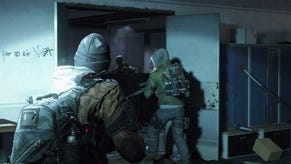The Division review
Divide and conquer.
A week after the release of The Division, maybe we're finally in a position to pin down exactly what this big budget genre hybrid is. Maybe not, though. In the run-up to the launch of this ambitious online open world action RPG, countless comparisons have been made to Destiny, Bungie's own MMO-tinged shooter, though that only goes a very small part of the way towards understanding what Ubisoft Massive has conjured up here. Given that The Division is perhaps the ultimate manifestation of Ubisoft's maximalist design philosophy, it might be simpler going through what it isn't.
The Division is an open world game for starters, taking in a broad and authentic recreation of a Manhattan abandoned in the wake of a virus outbreak. It's a beautiful, eerie backdrop for an ever-growing checklist of objectives. The veins of the map are lifted from every other Ubisoft open world game, so you'll likely be familiar with the underlying pulse: head to an unexplored area, unlock a safe-house, and your to-do list will bloom with side-missions, collectables and mini-encounters. Tick them off and then watch the XP trickle in as you work towards the level cap.
It's a cover-based third person shooter, too, and a pretty effective one at that. Hunker down behind concrete pillars, car fenders or office desks as you work your way through mobs of enemies, peering out into the crossfire to nail a headshot. The gunplay isn't a major step forward; its impact is muted by enemies who swallow up whole clips of ammunition, and nor is it overly refined, but encounters are lent a dynamism by a smart cover system that applies itself well across the map, and combat gains the brilliant kick of panic that marks out the best of its type as you scurry between objects under duress of fire.

It's an action RPG as well, with an appetite for loot, loadouts, perks and abilities that pushes you towards the constant optimisation of your character. The Division's the kind of game that will deafen you with noisy gunfights but where you'll find the real excitement hidden within its messy nest of menus, after realising you've got a new pair of gloves to equip that will push your DPS ever higher.
Finally it's an online game, where you can partner up with a squad to take on The Division's many challenges, to mop up its extra-curricular activities or see through its main missions. Even if an online connection is always required, it's possible to play through The Division entirely solo - and it's viable to walk away after some 35 hours once the final story mission has been conquered and be reasonably satisfied with an atmospheric, well executed open world shooter.
There's more to it than that, though, and while The Division is a hybrid of familiar components it has a personality all of its own. A certain clumsiness defines much of it - witness the baffling horror when ten years of vogueish game design come crashing together in one UI - yet more often than not it finds harmony in its disparate parts, becoming one of those rare games that lives up to its original premise. When all those cogs are whirring together, it's perhaps the finest game to emerge from the Ubisoft machine in years.
Part of The Division's personality is a little obnoxious, admittedly - this is a Tom Clancy game after all, that believable real-life setting and delectable premise coming with a side order of a questionable worldview and a story that would be objectionable if it weren't so forgettable and fumbled in its delivery.
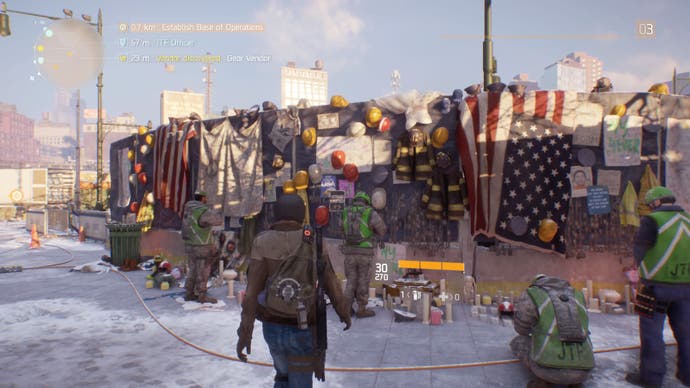
You're never quite sure if The Division's self-aware enough to acknowledge the irony of having you go after looters in your pursuit of your sweet, sweet loot, or of the nastiness of you waging war on the disenfranchised working class left in the city by your privileged enclave of career professionals. It's a game that's quick to appropriate the imagery of 9/11, the snow-frosted streets recalling the ashen aftermath while makeshift memorials to the recently dead sit on street corners, but it that wears the veneer of tragedy too lightly, and too awkwardly.
The Tom Clancy name brings something else, thankfully, and in the tactical gunplay that comes alive towards the endgame, there's a callback to the strategy within series such as Rainbow Six and Ghost Recon, and a reminder of those games at their very best. The Division is smart to place an emphasis on its RPG elements, and smarter still to utilise a fluid class system that lets you dip in and out of its many toys and tools on a whim.
It encourages you to experiment, and allows you to tinker with squads until you've come up with the perfect alchemy of fantasy tech: flame-throwing turrets at one end and medpacks that can be tossed into the fray to revive downed allies, all sparking off each other while you sync up buffs that double your chance of hitting a crit. The lexicon of the modern day shooter quickly loses its aggressive sheen and becomes something far nerdier, and it's all the better for it.
The Division's greatest triumph is how it actively encourages co-op play. Unlike Destiny, it isn't shy to matchmake strangers for all situations, and joining a party for a story mission, free roaming in any given district or heading into the Dark Zone is a breeze - as it rightly should be when the emphasis is placed so firmly on team play. There's a natural, fluid strategy to firefights that's enhanced when more players are involved (strategy's the keyword here - remember that The Division is a game, fundamentally, from a studio who cut their teeth with tactical series such as Ground Control and World in Conflict, and you can feel that heritage bleed through the exquisite trappings Ubisoft has afforded them here.)
In the Dark Zone, the PvP area squat in the centre of The Division's open world map, the glint of ambition that makes this game worthwhile shines brightest. It's an open-ended playspace, patrolled by high-end enemies who hold some of the very best loot but who also require a concerted effort to down, leaving you free to partner with other players who patrol the zone before hot-footing it to an extraction point to fully acquire your earnings - knowing full well at any point your team-mates could go rogue, downing you and taking all the loot you've recently found in the process.
It promises great tension and delivers - in the closing seconds before an extraction when mobs rush you down and other players come sprinting in having acquired the scent of sweet loot. For all that, it can be a surprisingly friendly place, too. For all its grim window dressing, there's a nice sense of camaraderie flowing throughout The Division, enhanced by the absence of any deathmatch or more traditional PvP modes. In its place there's the nervous uncertainty when stumbling upon a new player, quickly defused by reaching for the emote wheel for a cautious wave or an energetic round of star jumps before partnering up for a new alliance.
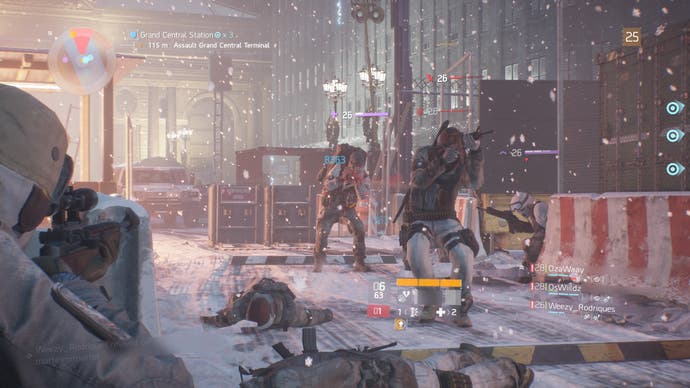
The Dark Zone has a novelty that's not quite replicated elsewhere, where looping side mission types add dull friction to the grind. By the time the endgame rolls around, when you're in pursuit of the Phoenix Credits that are required to purchase the high-end gear, acquired by taking down named enemies in the Dark Zone and by rolling through Dailies, the story missions come into focus once again: they're relatively plentiful in number, and resourceful in their use of the New York setting, from shootouts in department stores resplendent in their festive dressing, complete with huge destructible baubles, to pitched encounters in the lecture halls of the UN.
Some of The Division's problems come into focus then, too - its action can be overly scrappy, blotched by bugs that see your trigger fail to register or your gun plain disappear, something that's particularly infuriating in the heat of a high-end fight. The Division doesn't seek to find a solution for the repetition that's endemic to games of this nature; it gives itself over wholly to the treadmill, whereby you rush through the same objectives and hope to get lucky with a loot drop.
When the familiar routine kicks in towards the endgame - when you're deep in the rut of daily missions and farming routes in order to craft high-end gear - it's the city that helps carry it all. The Division's New York is littered with brilliant incidental detail; arguments caught in the windows of townhouse apartments, tragic phone conversations overheard and whole complexes abandoned for you to morbidly pick through. It's littered with content, too - and in invoking the appetites of loot-hungry MMO players, Ubisoft's big budget bloat seems to have found its perfect match.
What is The Division, then? It's a vast, scrappy yet endearingly ambitious adventure that, for the most part, delivers on its promise. It's a city still under construction, too - we're yet to see the first Incursion, The Division's take on raids, that's coming in a free update next month - though in the early days Ubisoft Massive has shown a willingness and ability to act quickly upon issues and player complaints that others would do well to learn from. Not that a major overhaul is needed. The Division is a fascinating hybrid, a game that's smart and stupid in equal measure but one that's rarely anything less than enjoyable.
